Roof tents are often maligned by Hardcore Outdoor Enthusiasts (HOEs). They will shout things like: "I like to camp away from the road/my car/other people! Honestly, who's paying for these things anyway? They're ludicrous money." Once upon a time, we might have nodded along quietly - if only to pacify them - but having tested the TentBox Classic 2.0 over 10 days in and around the Wye Valley, we're now firmly in (well, on) team Roof Tent and are willing to fight for their case*.
That's because despite its name, using a roof tent is really another way of turning your existing car into a small camper van, and for significantly less money than buying one outright. Among the myriad choices of roof tent available, the TentBox Classic is the OG. In this review, we’ll explore the TentBox Classic 2.0 in detail, covering its design, setup, comfort, durability, and overall value.
*an ABS hardshell one, as it happens.
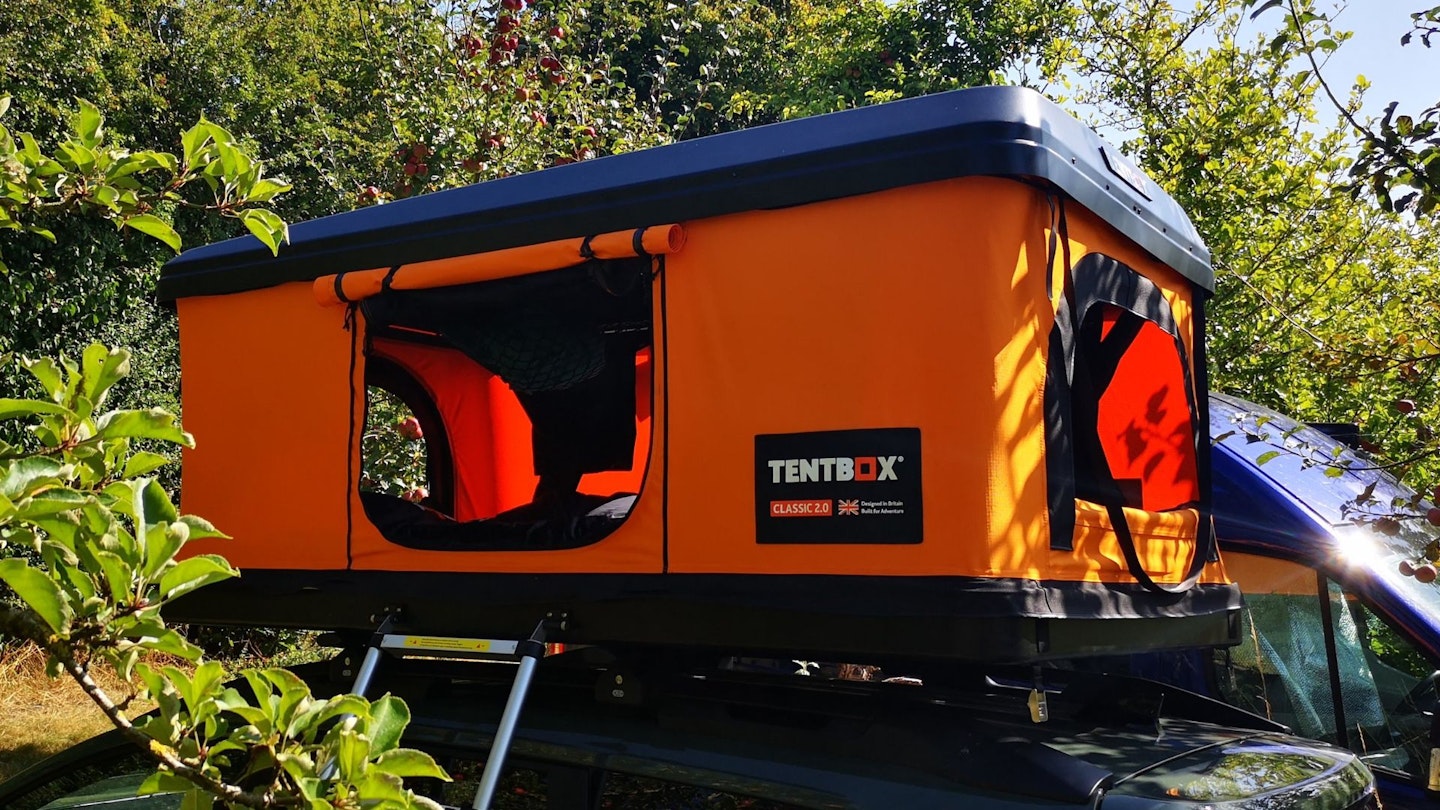 LFTO
LFTOtentbox.com
Pros
- Hard shell design
- Gas struts
- Sturdy
- Useful accessories available
Cons
- Heavier than soft shell models
| Sleeping capacity: | 2 |
| Weight: | 67kg |
| Dimensions open; | 128 x 218 x 100cm |
| Dimensions closed: | 128 x 218 x 35cm |
| Wind rating: | 39mph |
| Materials: | 280gsm rip-stop polyester canvas walls (3000mm HH); UV-protected ABS shell |
Materials, design and build quality
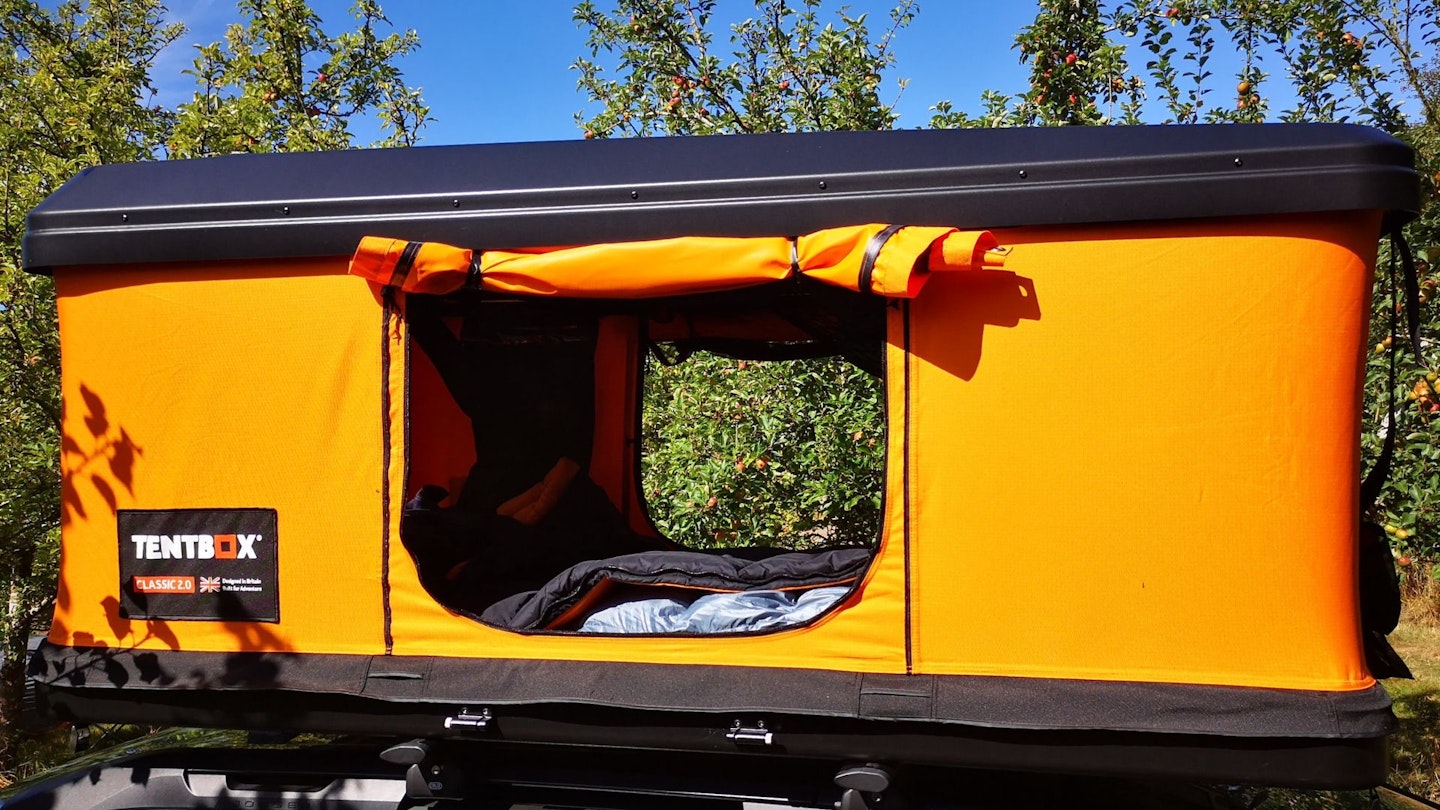
The TentBox Classic 2.0 is essentially a bedroom for the top of your car, springing up from its case in under 30 seconds by way of gas struts which require you to do nothing else except watch in awe. This is a huge plus when pitching late at night, or in driving drain, as it's as simple as park, unclasp, fix the ladder, and clamber in.
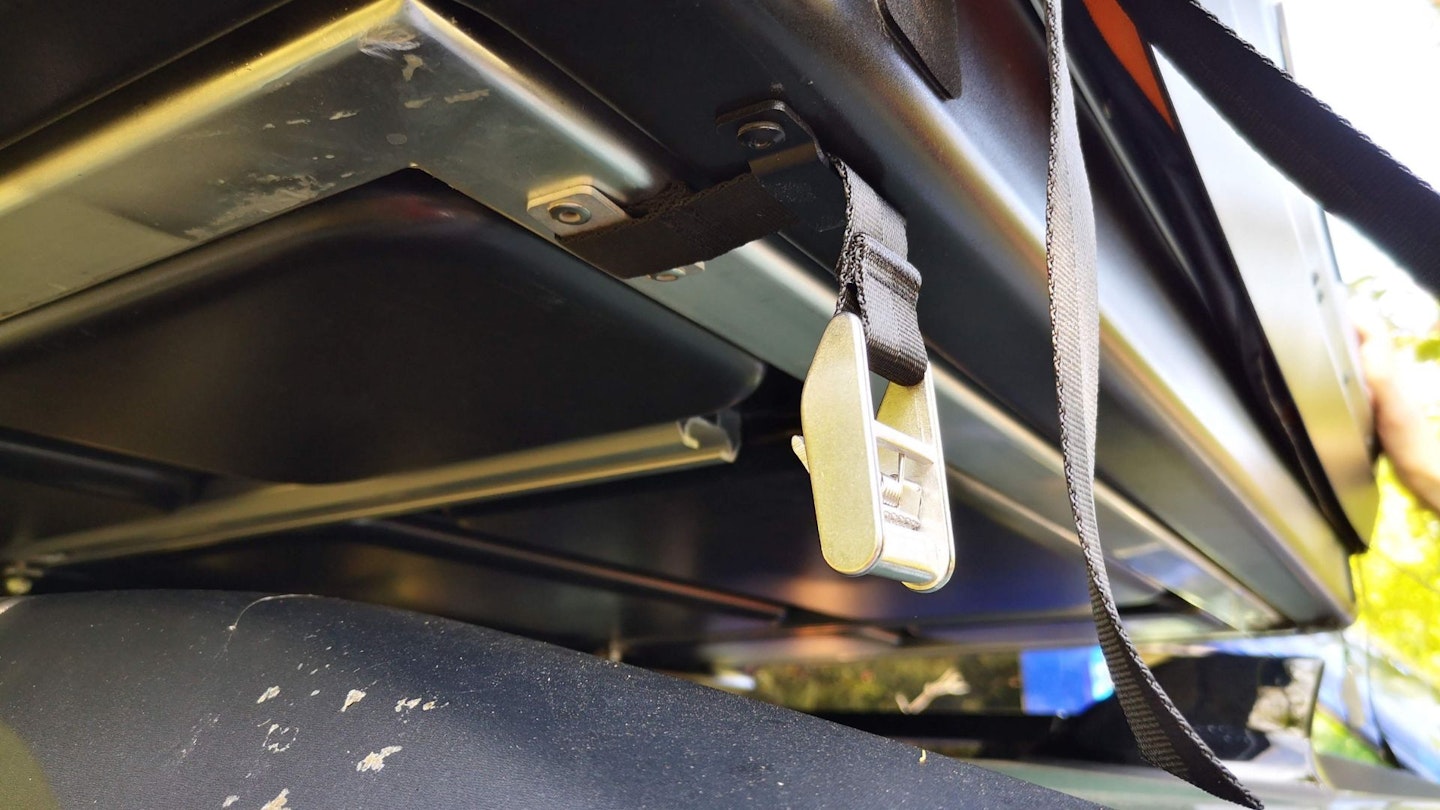
The Classic's ease of pitching and hardshell cover does mean it weighs more than other designs, clocking in at 67kg, but this is offset by the fact it takes no time at all to put up and down. Which is, by the way, a 5-minute job – easier with two of you but equally fine to do alone at 6am in the pouring rain if you want to break camp and get away early to avoid traffic. You simply pull down on the large strap to collapse the gas struts, then tuck the tent fabric in and clamp the shell down using the ratchet straps.
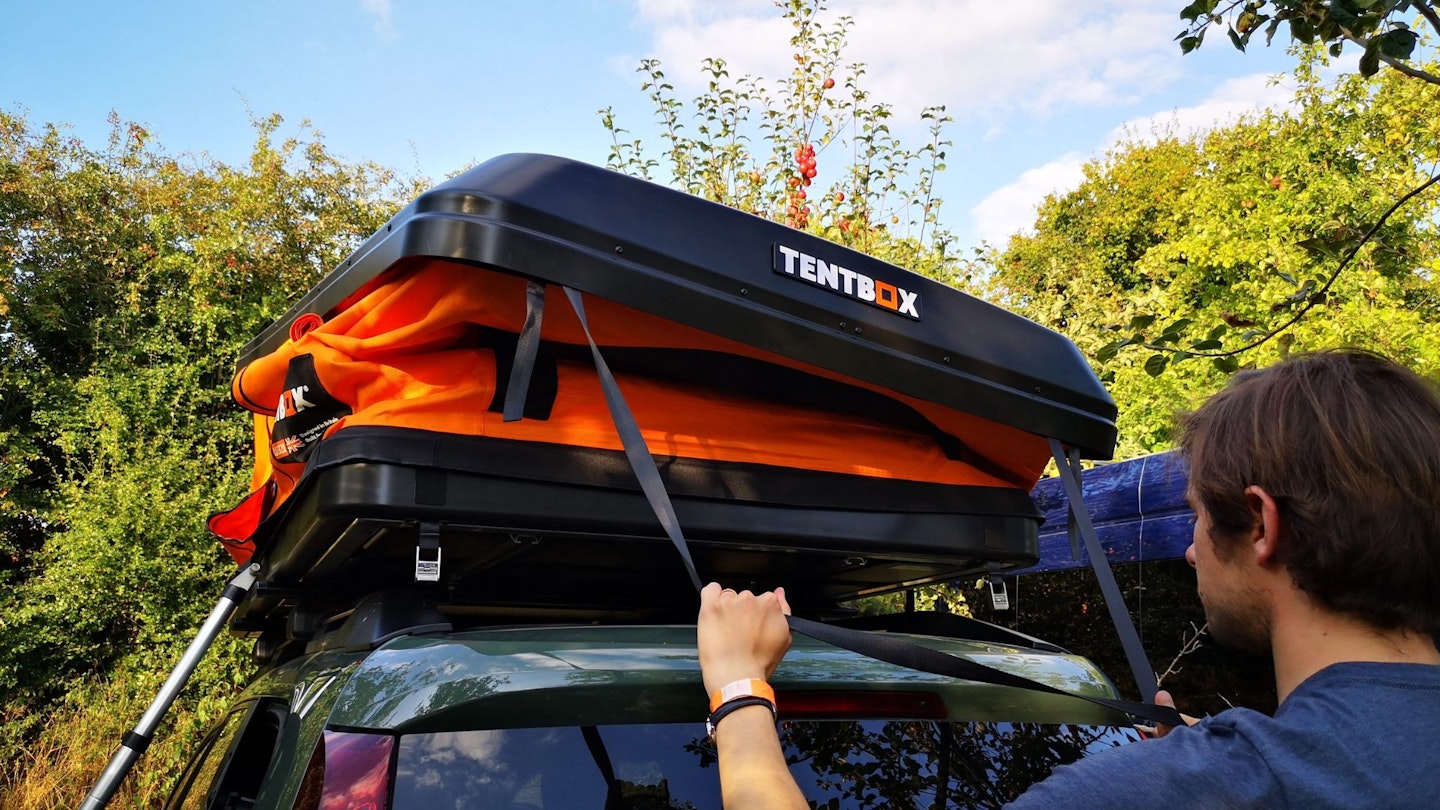
Materials-wise, the outer shell is made from durable, weather-resistant ABS plastic, ensuring protection against the elements, and minimising wind resistance when mounted on your vehicle, reducing the impact on fuel efficiency – though at above 70pmh (naughty) a certain wibble in the vehicle's handling is not unnoticed.
At sensible driving speeds, however, it's absolutely fine, and far kinder to the fuel consumption than the boxier softshell models. The whole thing measures just 35cm deep when packed down, and the ABS roof feels pleasingly sturdy when you're inside it; rain bounces off and it certainly feels more like a cosy den or a small bedroom than a tent.
Shop this product
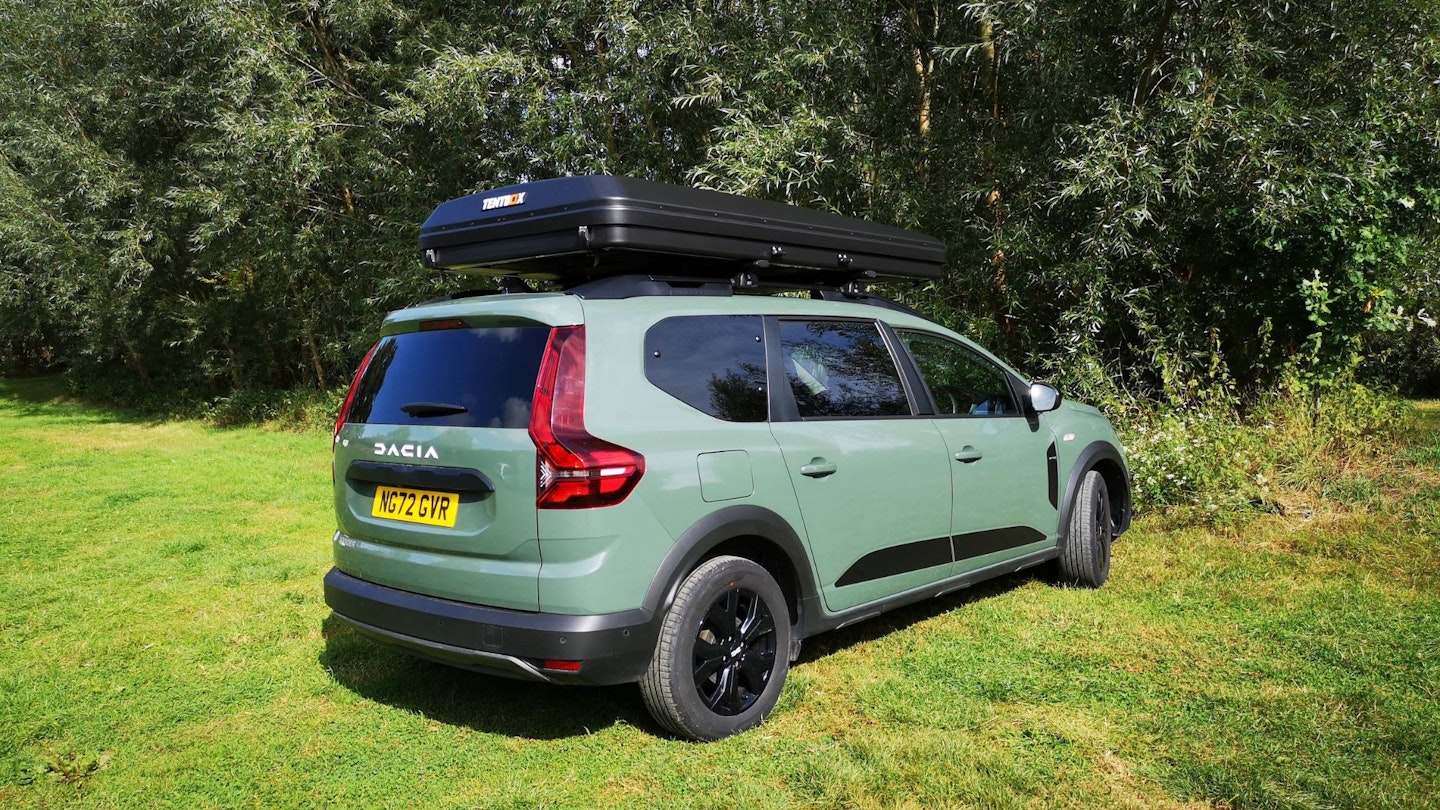
We think the orange choice for the canvas looks great on top of your car, and in general the TentBox Classic is a real ice-breaker for friendly campsite conversations. The tent fabric itself is crafted from a high-quality, 280GSM ripstop polyester-cotton blend, which feels bombproof when tensioned under the gas struts. This material strikes a balance between breathability and water resistance, making it suitable for various weather conditions, but TentBox recommend you crack a window at night to avoid condensation buildup. We had no trouble even on cold nights with condensation when following this advice.
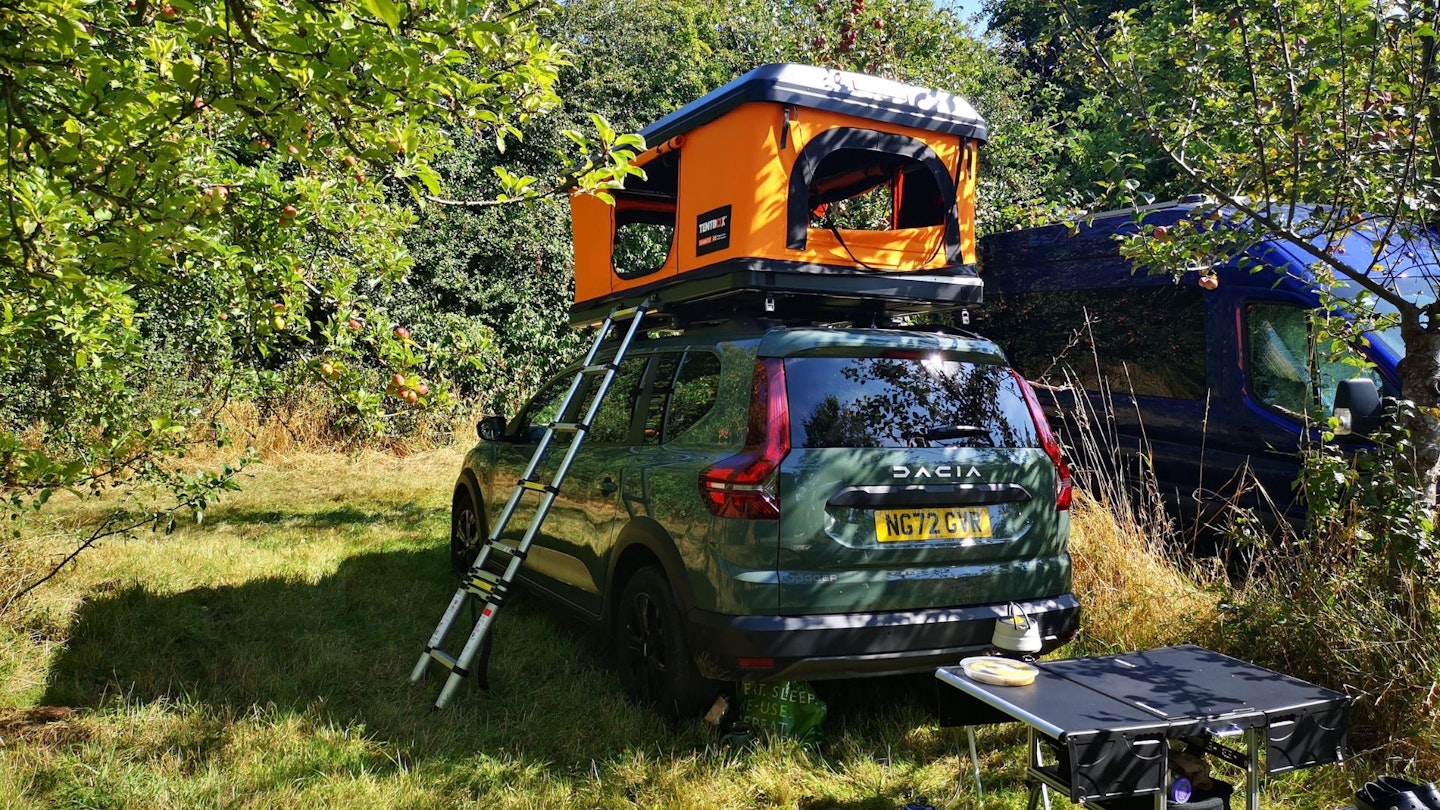
The seams are double-stitched and taped, ensuring no leaks during heavy rain. The mattress and our duvet, however, got very wet inside on our first night next to the windows, but this was due to user error. We didn't roll down the outer flaps to protect from high wind and rain, then found out the hard way that the inner zips are not taped! Subsequent nights however, once we'd learned our lesson, were completely fine.
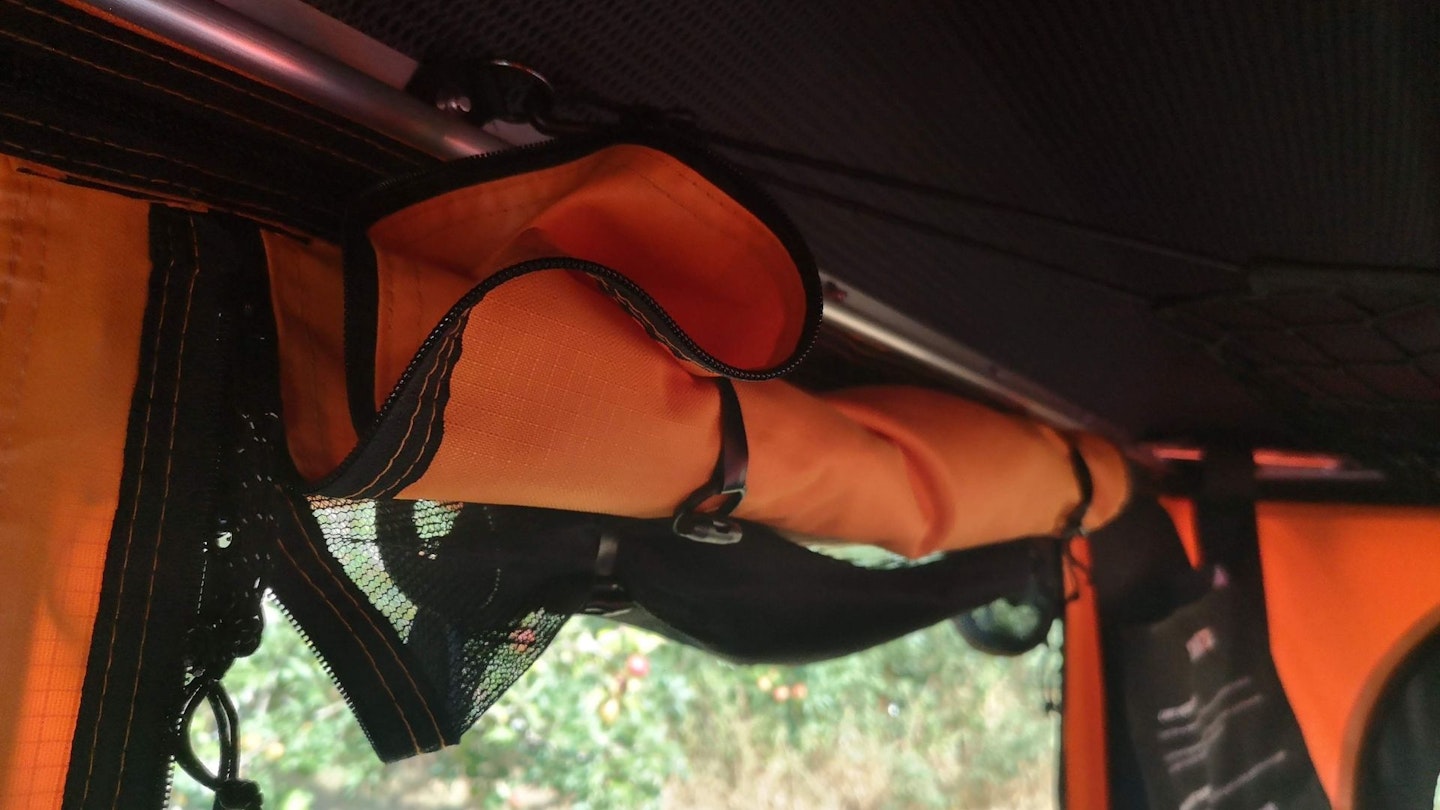
Inside, the Classic is surprisingly spacious. It is all, essentially, bed. This measures 2.4m x 1.4m, providing ample room for two adults, plus a dog or even a small child. The mattress, a 6cm thick high-density foam offering, makes for a wonderfully comfortable night's sleep, which we found to be far superior to most camping mats or air mattresses, and more akin to a bed at home.
Shop this product
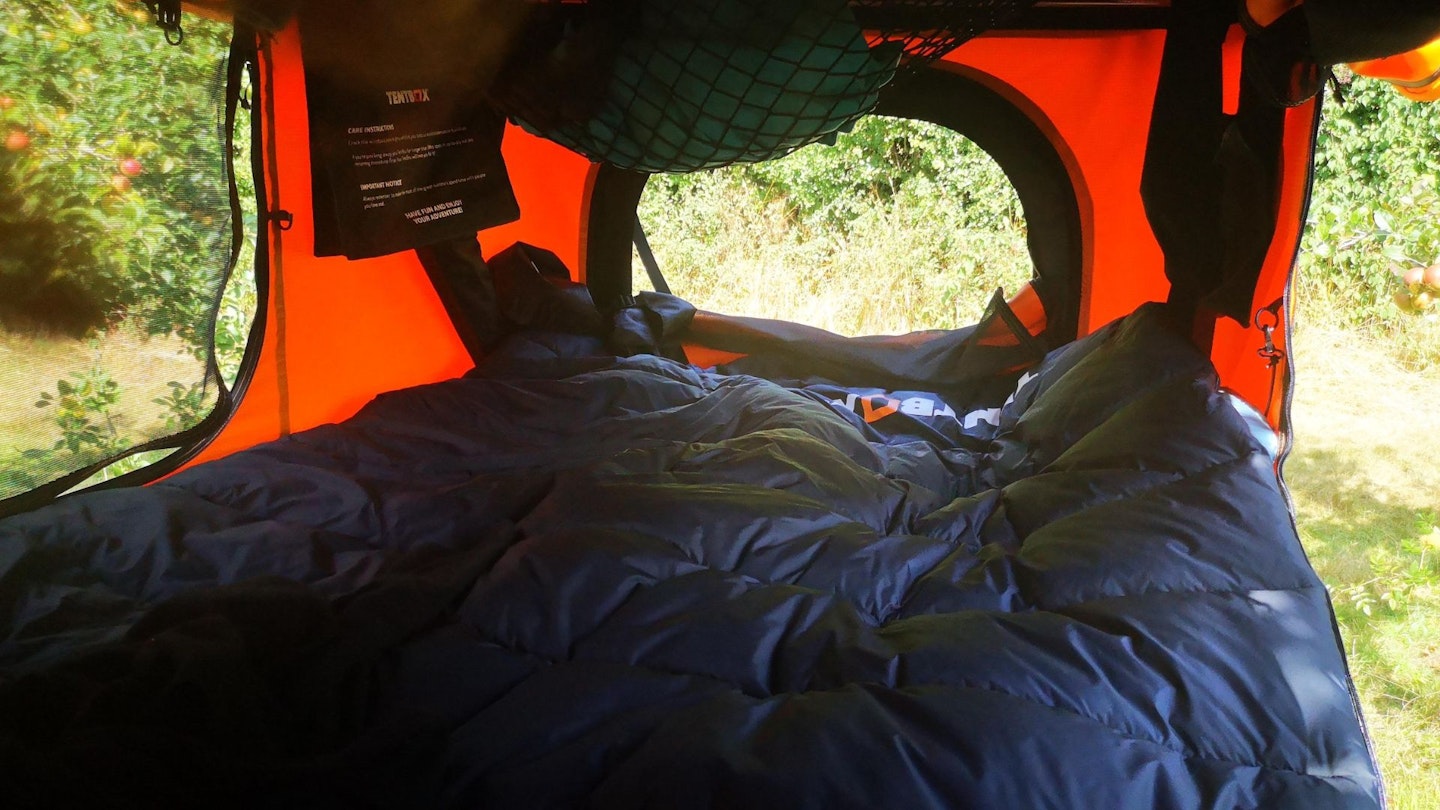
Additionally, the tent includes several deep storage pouches inside, and a cargo net, plus a clear pocket for the TentBox Lightbar which does a stellar job of illuminating the interior. We found the storage pockets to be useful for shoes as you're coming up and down the ladder, but did find that our crocs fitted in the gap between the roof rails and the car without getting wet.
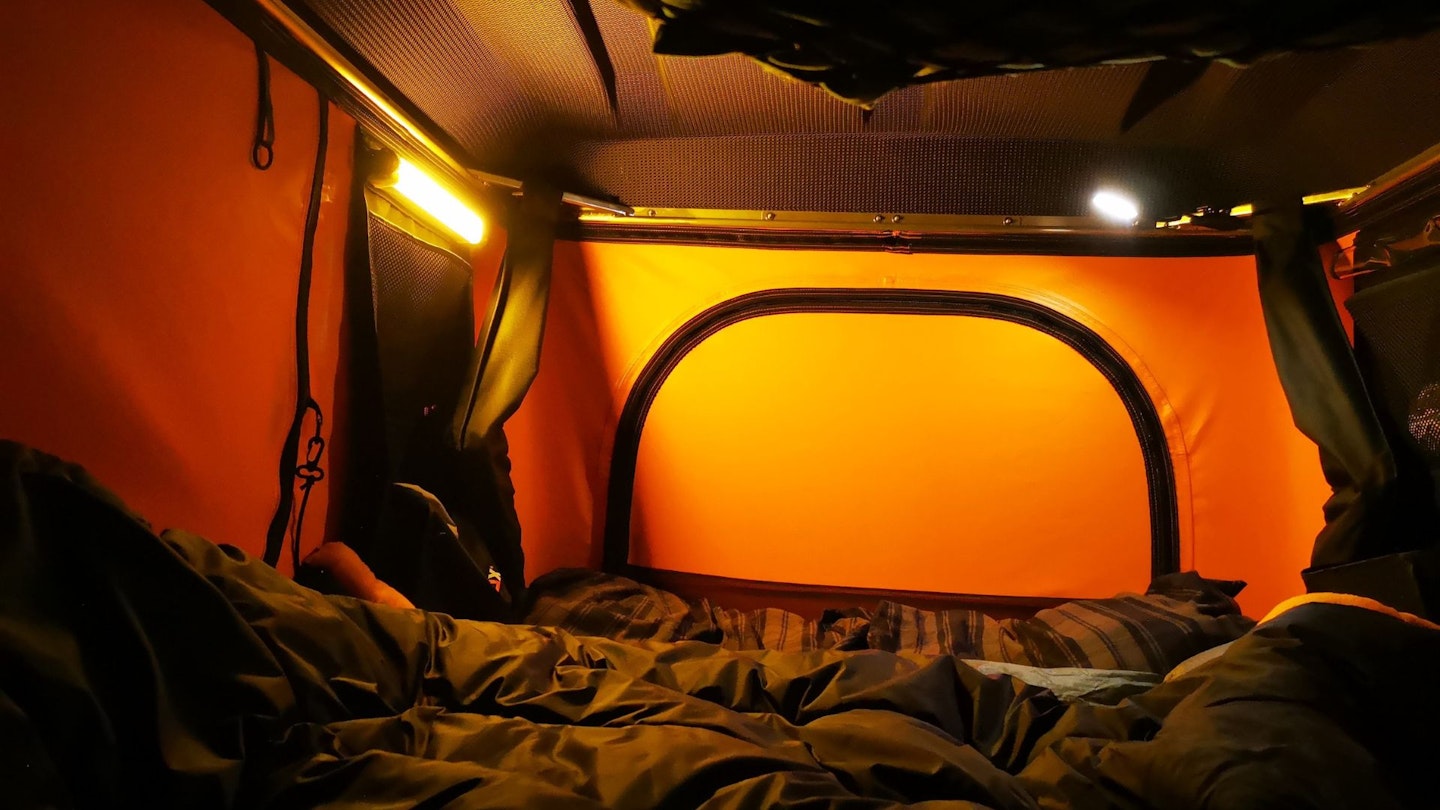
The ladder, which is included as standard, can be affixed on either side of the TentBox and slots into place easily, feeling super durable and high quality. It's easy enough to stow, but doesn't collapse down especially small, which may hinder room in the boot of a hatchback but we found no problem with the estate car we used.
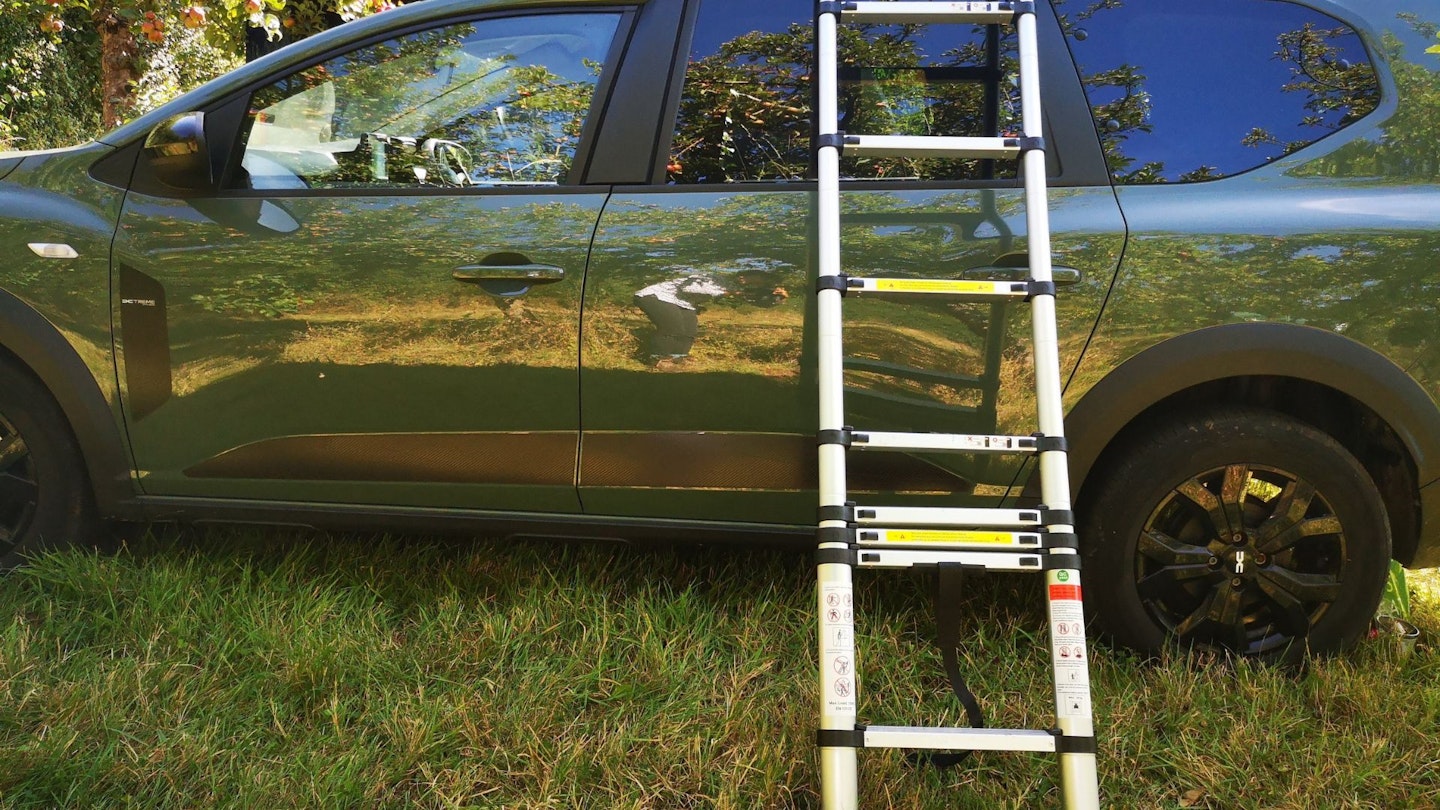
Comfort and liveability
The TentBox Classic offers a level of comfort that few ground tents can match. The built-in foam mattress is a highlight, providing a comfortable and supportive surface for a good night’s sleep. The tent’s elevated position keeps you off the cold, uneven ground, reducing the chances of you waking up completely stiff as a board. We felt a lot warmer higher up too.

We (5'3" and 5"9) found the headroom quite adequate for sitting up comfortably, though taller folk might find it a bit cramped when moving around trying to get changed. The tent’s height is more than sufficient for most camping activities, such as reading, telling the midge to bug off, or simply enjoying the view from above.
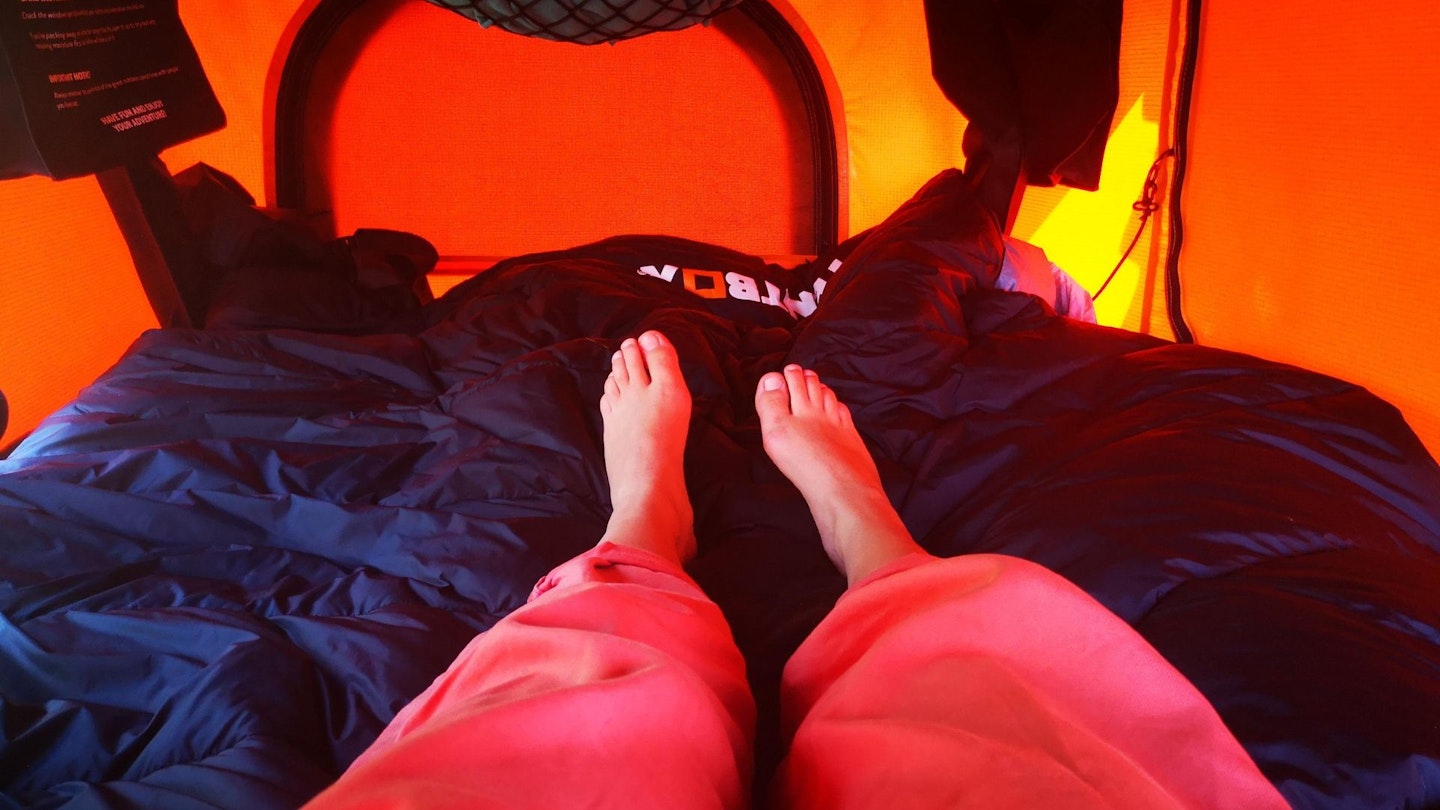
We also found the length to be more than adequate for our needs, and were able to store excess clothing at the foot end for the duration of our trip, thanks to the TentBox Classic's ability to be close with a small amount of gubbins still in it. This also worked super well for leaving our duvet out too.
Shop this product
Windows
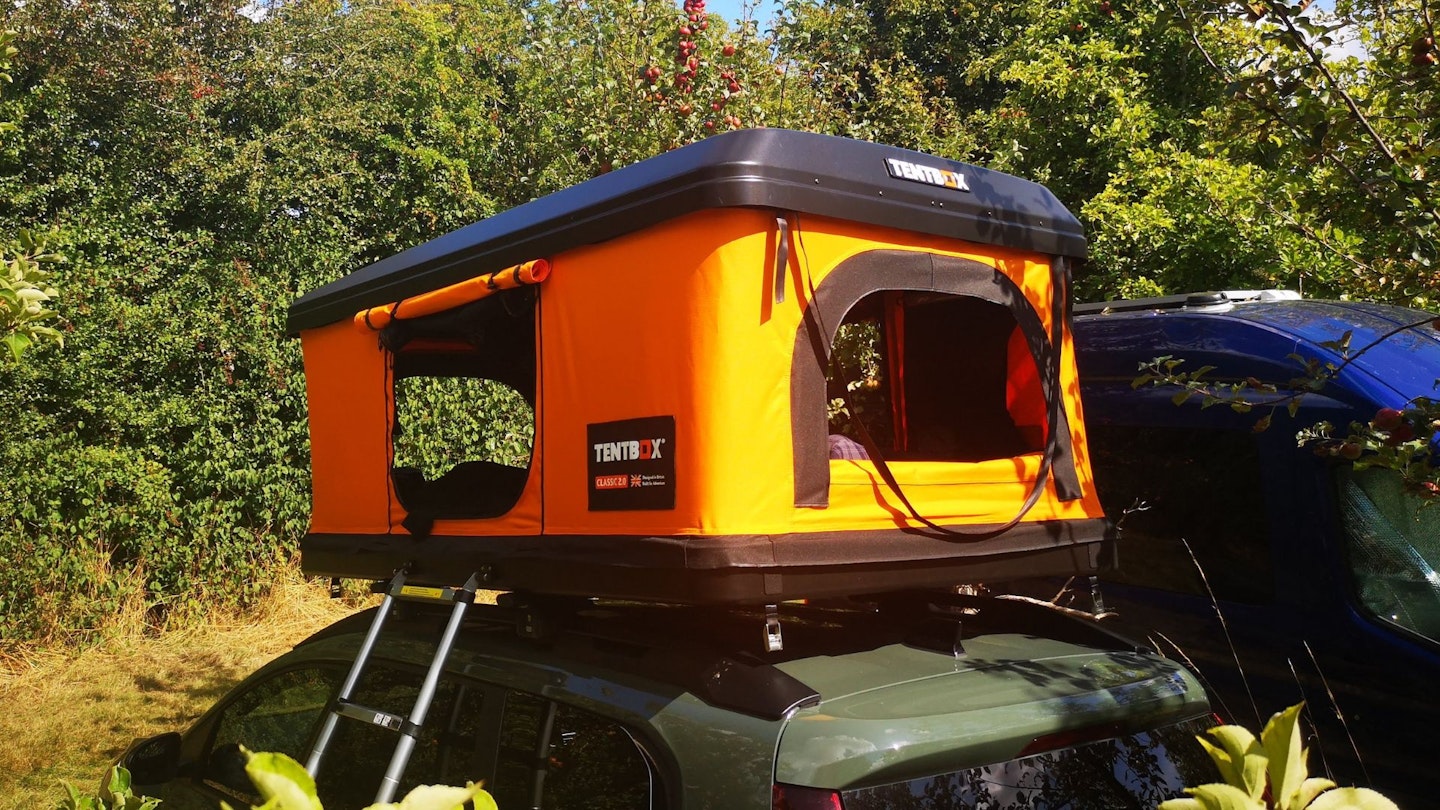
The TentBox Classic features six large cut-out windows, each with a mesh screen to keep insects out. These windows can be unzipped fully or partially, allowing you to control airflow according to the weather and how much curry your partner ate the night before. In warm conditions, the tent can be very well-ventilated, preventing condensation build-up, while in colder weather, the windows can be closed, but still cracked a little, to retain heat but reduce moisture.
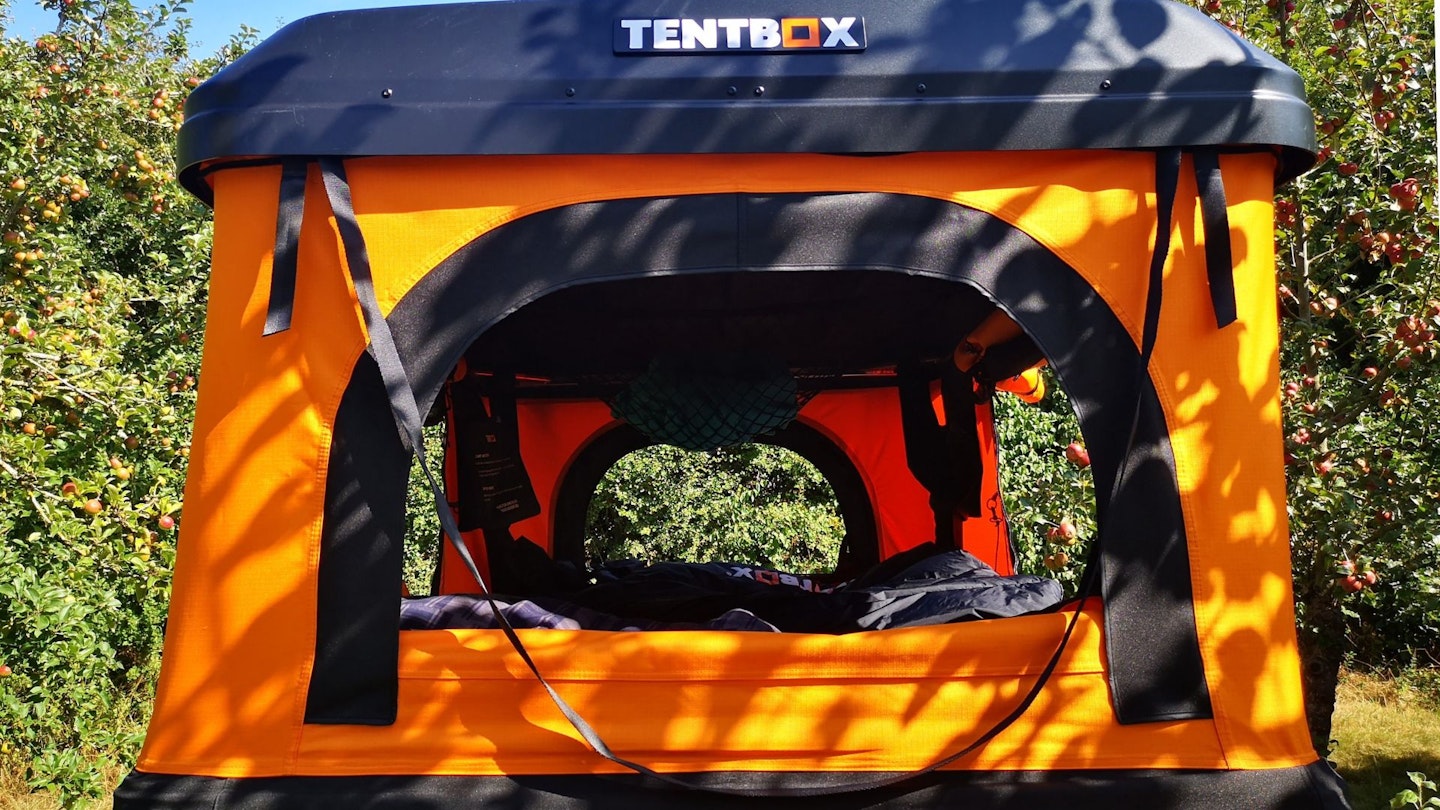
Although the classic orange colour isn't as dark as the black option, we still found it kept the morning light at bay for a while - choosing the black colour would be the way to go if you're especially light sensitive in the early mornings. The orange fabric, coupled with the great ventilation options, also meant that the TentBox didn't heat up in the same way as a darker canvas tent as soon as the sun rose, keeping us cool until at least 9.30am even in 23-degree heat.

When it comes to light, ventilation and liveability, the only thing we'd like to see improved upon design-wise would be the ability to let daylight in while retaining water-tightness; i.e. by use of a soft plastic tent window on one or more sides, either addition to or as a replacement for, the existing mesh screen. Currently, you have the option of watertight and no light, or just mesh which lets everything in except bugs. We'd find this especially useful in Scotland, as you'd be able to hide from the rain while still being able to watch it fall.
Durability and weather resistance
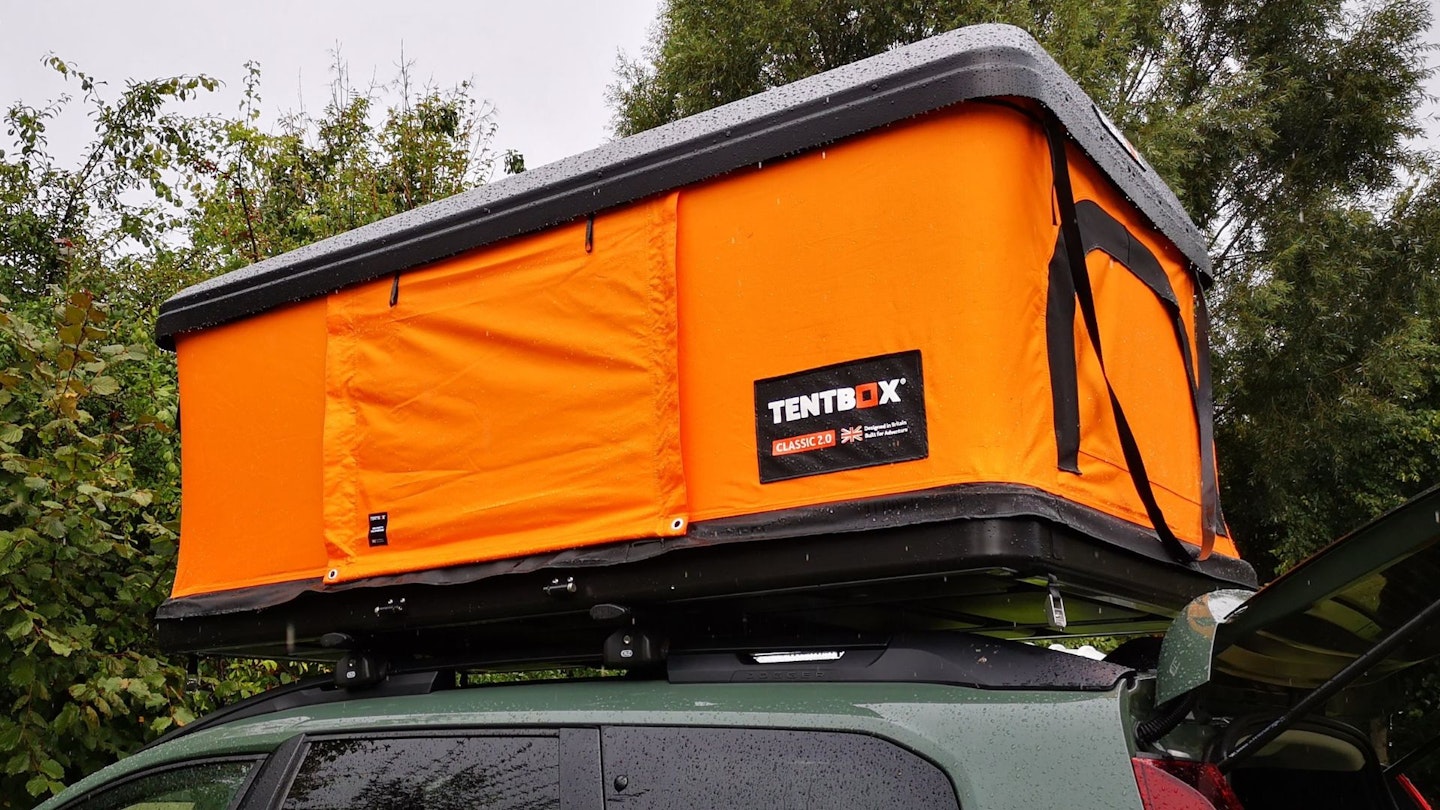
The TentBox Classic is built to withstand hardcore outdoor use. Its sturdy ABS shell and tough tent fabric are designed to endure harsh weather conditions, from heavy rain to strong winds. The Classic’s frame is constructed from lightweight yet durable aluminium, ensuring it remains stable even in adverse weather up to 39mph winds - which is gale force 8 and unlikely to be a cause for concern for the vast majority of the year.
Shop this product
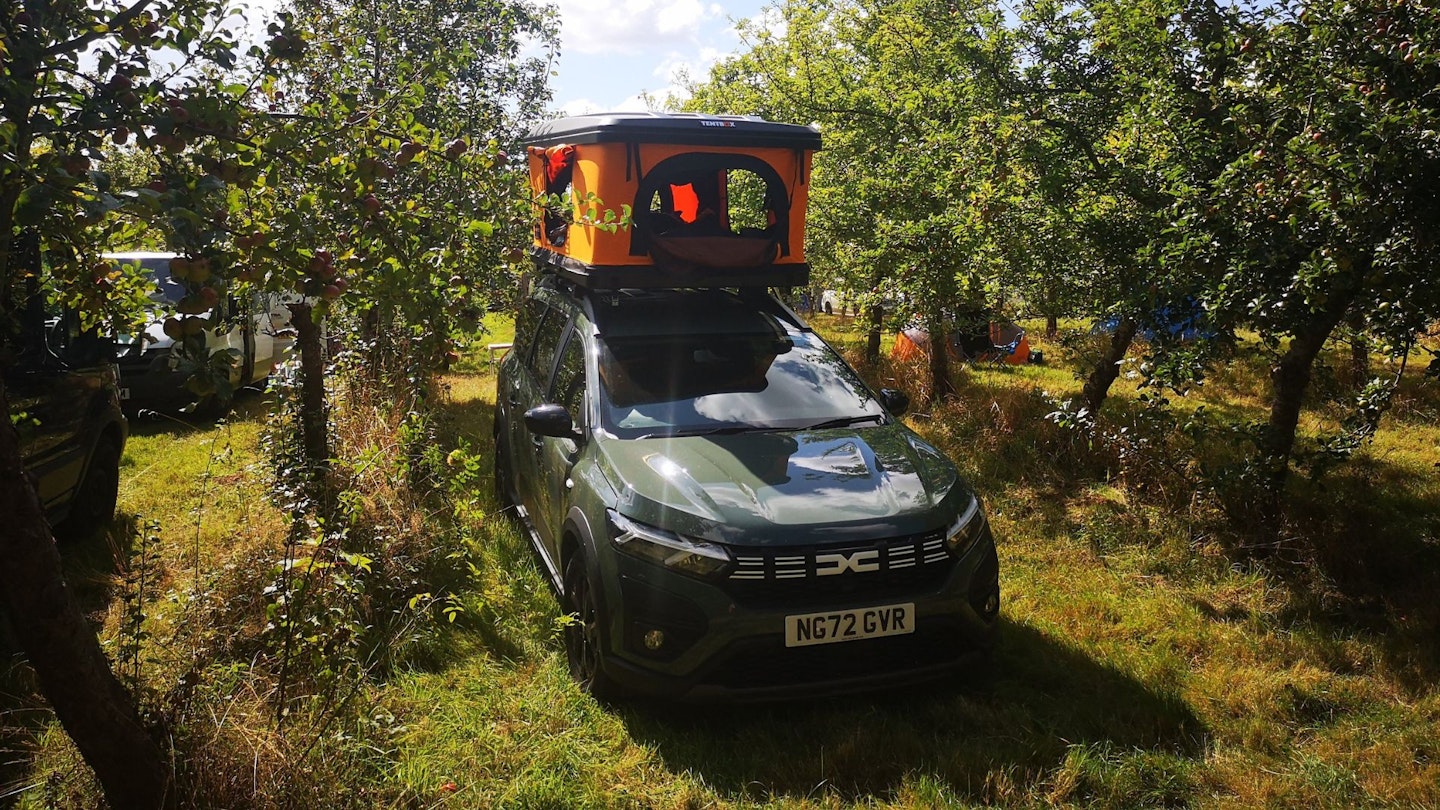
However, like all roof-top tents, the TentBox Classic does have limitations in extreme weather conditions. Very high winds can cause some movement due to the perpendicular nature of the TentBox walls - this is not designed to be used in a hurricanes (but then again, not much is).
Of course, no matter how strong the wind, you're never going to be blown away in it because of the tent’s secure mounting system, unless your car is made of cream crackers. In cold weather, additional insulation may be required to stay warm, as the tent is not designed for extreme cold without supplementary layers - which, incidentally, are sold on TentBox's website as the winter insulation kit. Bingo!
Portability and vehicle compatibility
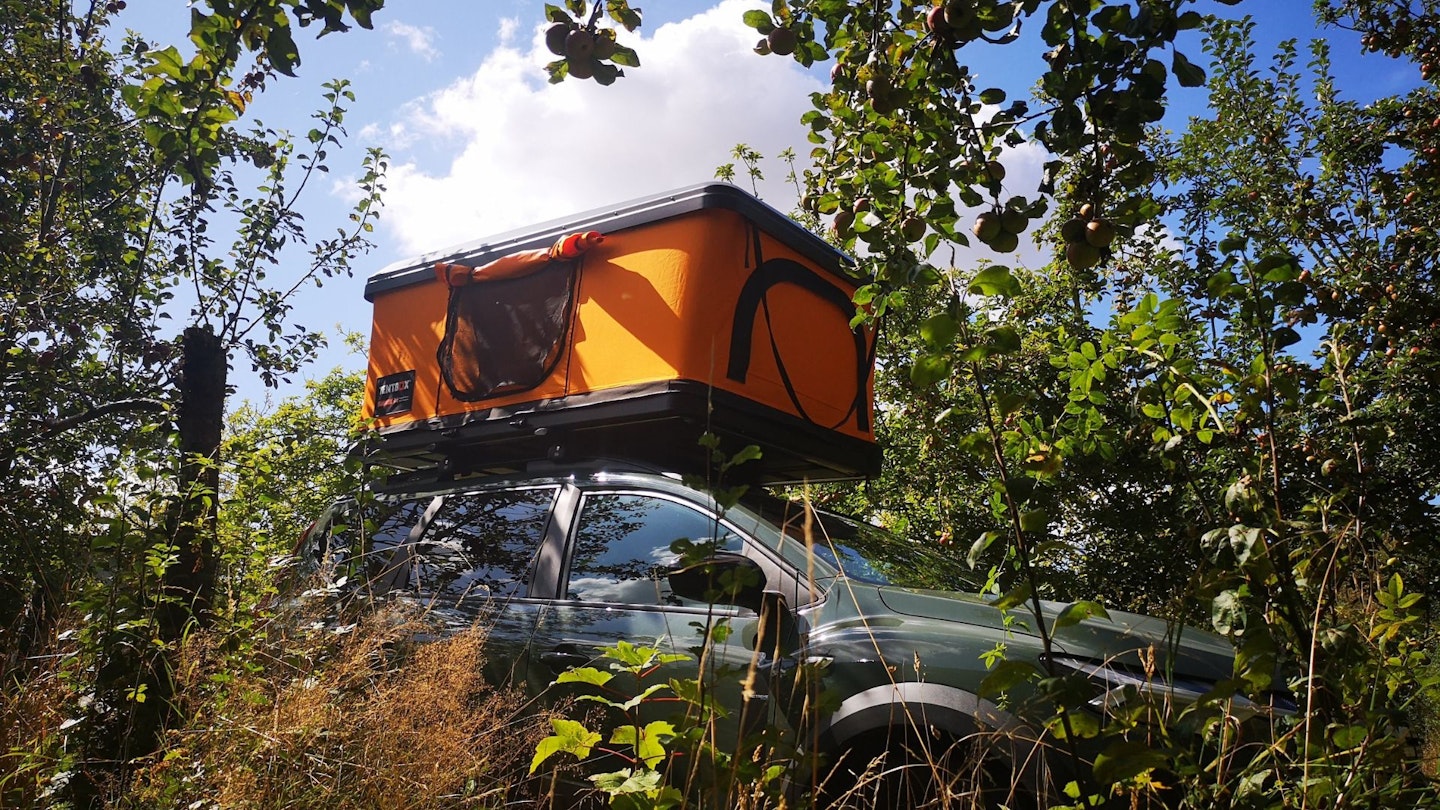
One of the concerns potential buyers might have is whether their vehicle can accommodate a rooftop tent. The TentBox Classic is compatible with a wide range of vehicles, from SUVs to smaller hatchbacks, as long as they have suitable roof bars. Weighing 67kg, the TentBox Classic will fit well under the dynamic load limits of most roof bars - but the static loads are usually much higher, accommodating up to 150kg in many cases, so you can happily stay in it without worrying about breaking anything.
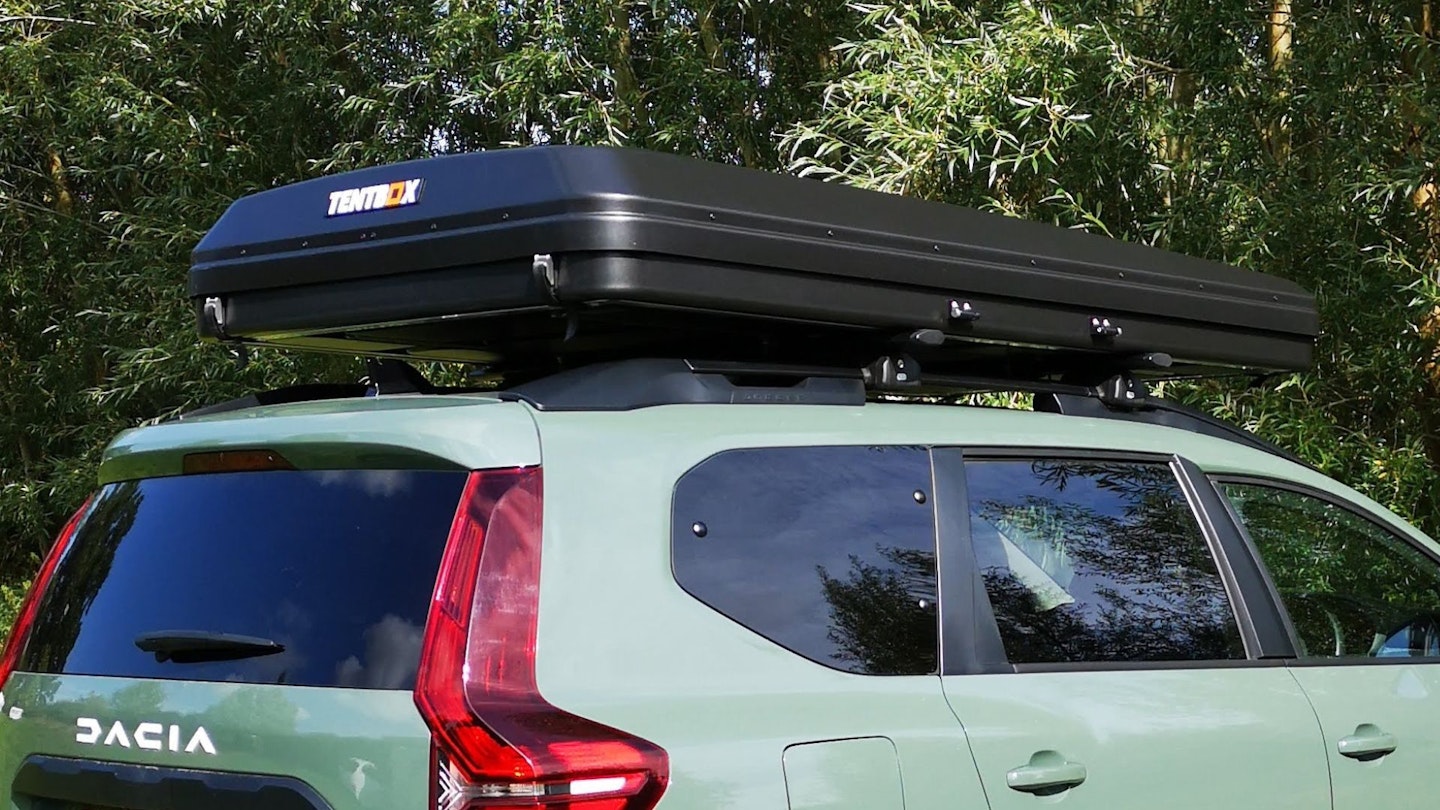
When not in use, the TentBox Classic adds minimal bulk to your vehicle, thanks to its low-profile design. Taking it off and on the vehicle is a more involved process, so most people prefer to leave theirs on, meaning you can get away for a weekend without even having to think about it. This makes it a practical option for those who use their vehicle for both daily driving and outdoor adventures. However, it’s worth noting that the added weight and height can affect your vehicle’s handling in strong crosswinds.
Value for money & competition
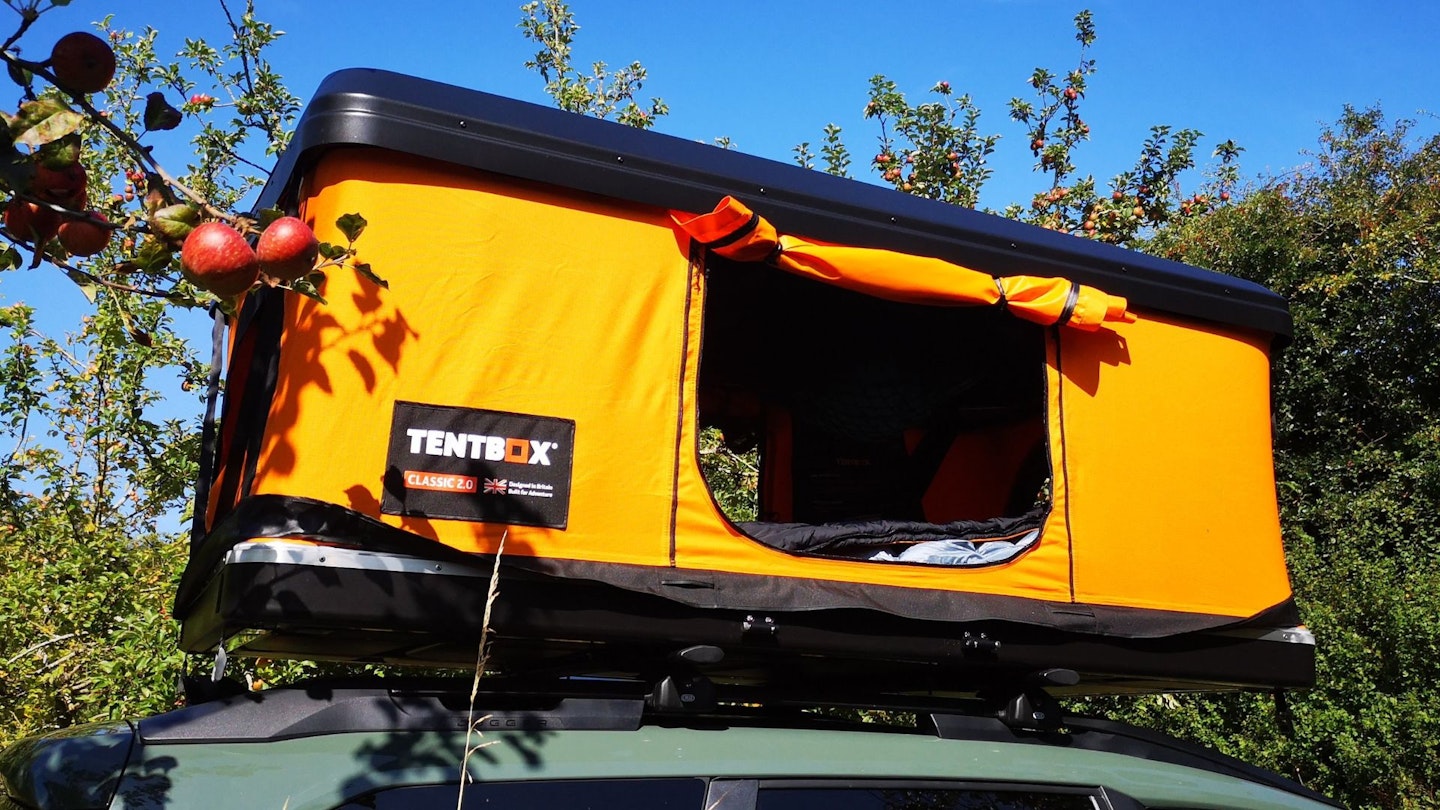
The TentBox Classic 2.0 is priced at the higher end of the roof-top tent market, but when compared to its rival use-case of a small van such as a Caddy or a Berlingo, offers excellent value for money. What you're paying here for with the Classic in comparison to other roof tents – aside from British design and excellent materials – is the ease of pitching and that efficient ABS hardshell casing.
And no, it's not the cheapest hardshell option out there: RoofBunk does undercut TentBox by a couple of hundred quid with their Roamer model - but then they charge a huge delivery fee, whereas TentBox is always free.
TentBox also have a 5-year warranty as opposed to Roof Bunk's 2-year one. And while we're waiting to test the RoofBunk version, we know for a fact that the attention to detail in the design and materials used here means the TentBox Classic 2.0 should last for many years, offering good long-term value.
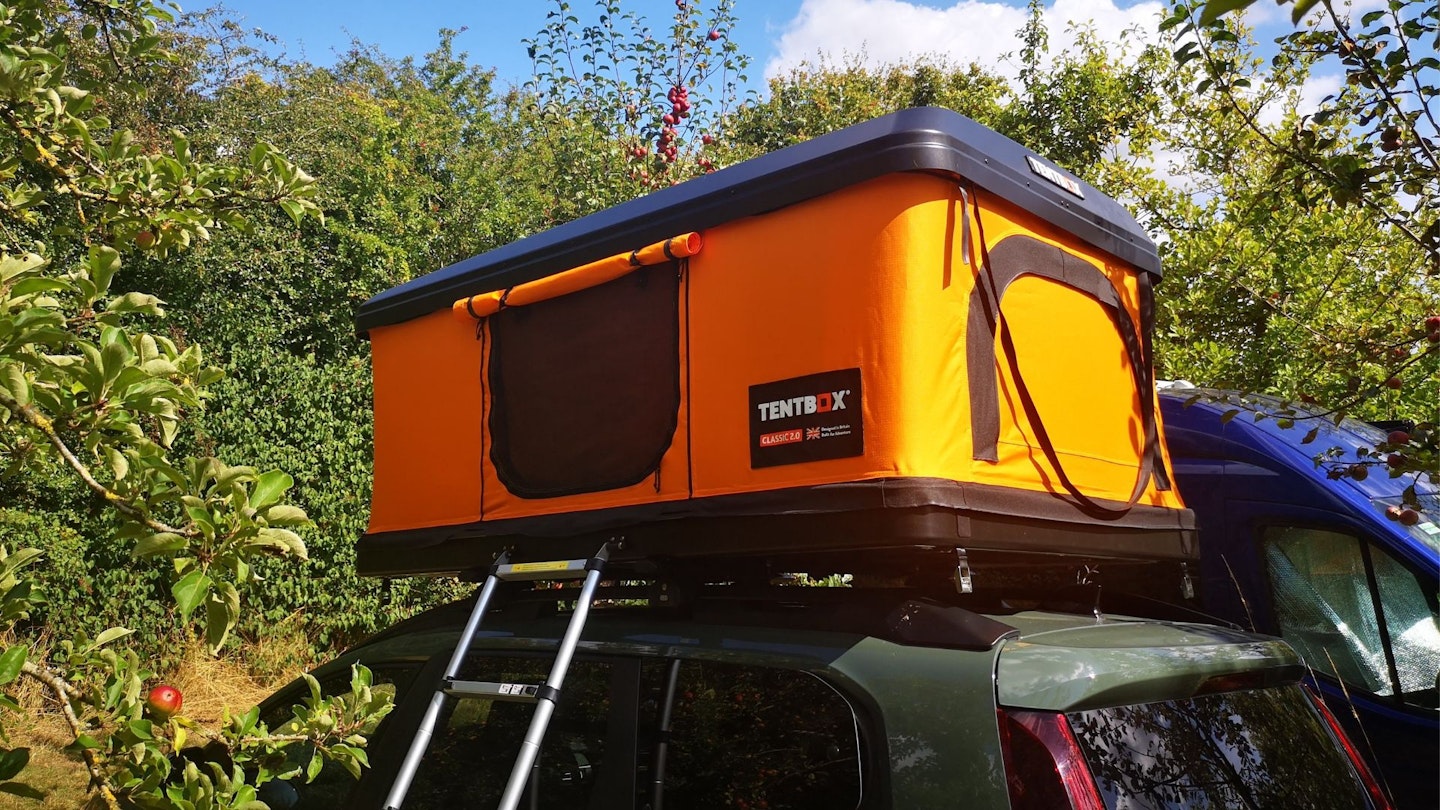
In comparison to other styles of roof tents, the Classic 2.0 additionally looks less 'tent-like' than other models, which means it hovers in a legal grey area between sleeping in your vehicle (allowed in England and Wales) and pitching a tent in a non-designated campsite (illegal in England and Wales). The ability to pitch anywhere you park within 30 seconds - and escape within 5 minutes if you need to - is a real advantage for getting out and enjoying the outdoors, whatever your tolerance to traditional camping.
Shop this product
Verdict
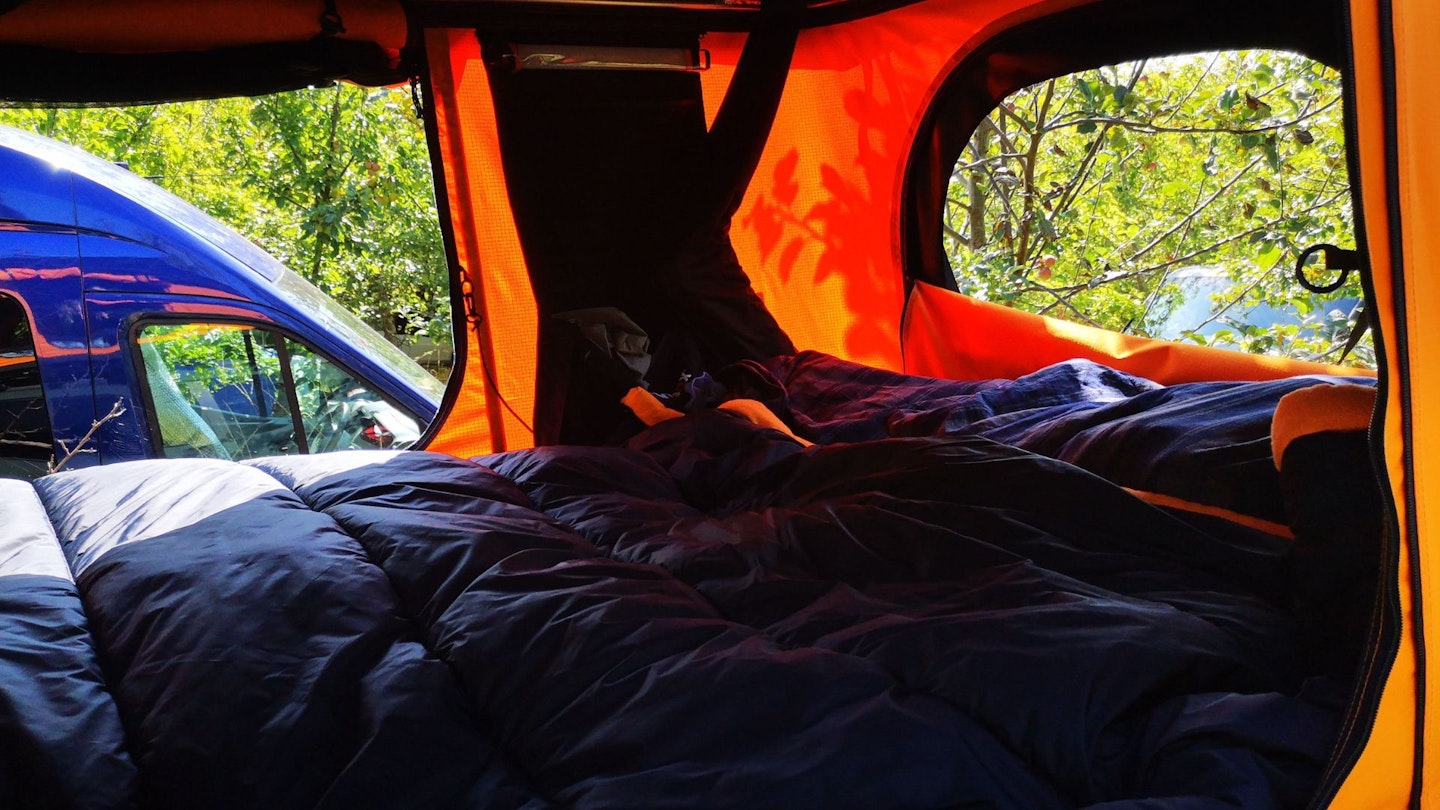
We really liked using the TentBox Classic. It's the OG roof tent for a reason, excelling in design, ease of setup, comfort, and durability, not to mention the cool orange colour available. And sure, it's expensive, but the TentBox Classic’s quality construction and user-friendly features make it a reliable and worthwhile investment.
Whether you’re planning a weekend getaway or an extended road trip, the TentBox Classic will ensure you have a comfortable and hassle-free place to rest, wherever the road takes you.
How we tested
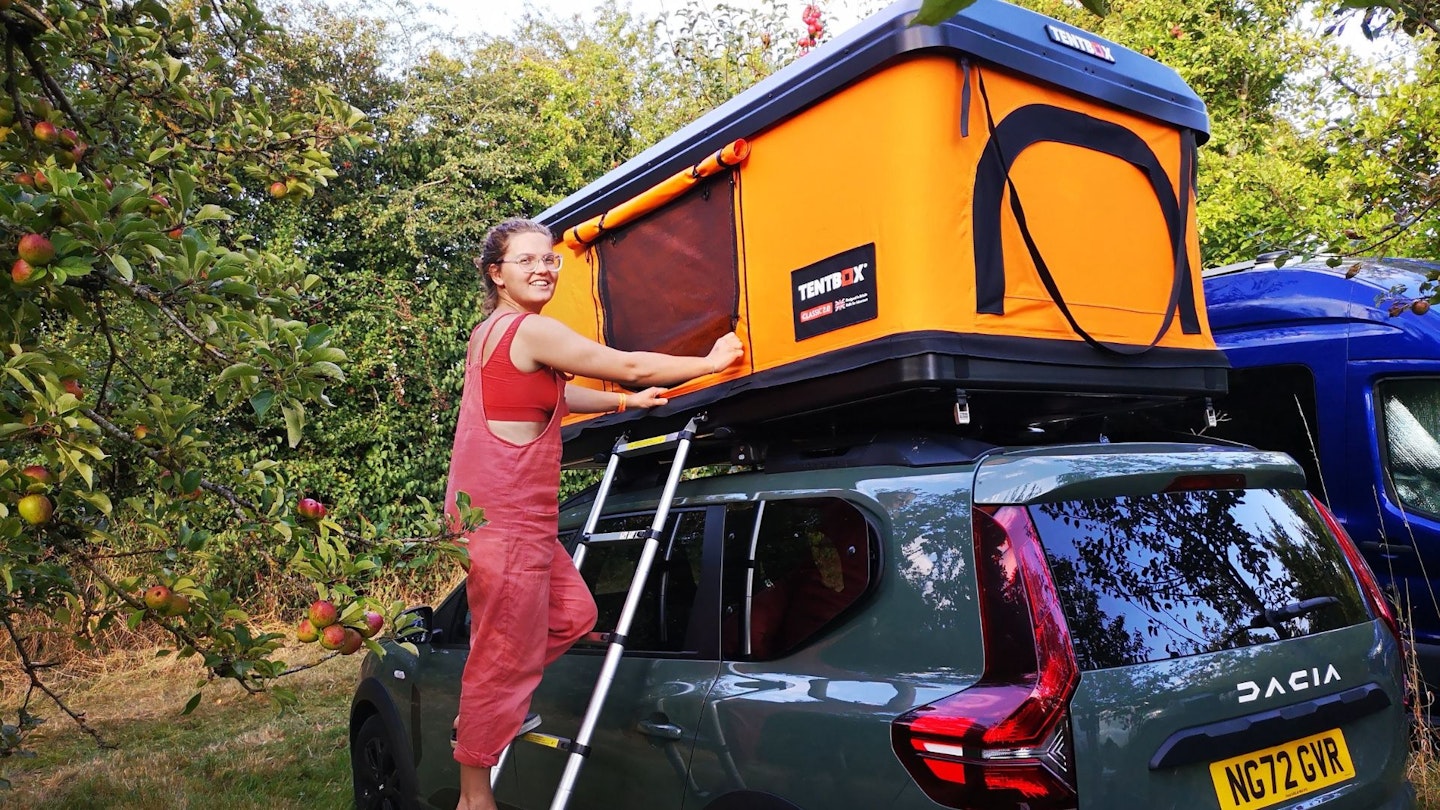
The TentBox Classic was tested by Fliss Freeborn and her partner over the course of 10 days in and around the Wye Valley in Herefordshire.
Usually based in Scotland, Fliss swapped haggis-infested heather moorlands for rolling English hills, and parked the TentBox everywhere from farmyards to campsites, including for four nights in a working cider farm on Ross on Wye (hence the apples).
Although the weather was mostly dry, she experienced some almighty downpours over the time she was testing, and was pleased to stay warm and dry throughout.
About the author

Fliss Freeborn is a writer for LFTO and is often described by her friends as feral, and her colleagues as eccentric. This was her first time using a roof tent and she really enjoyed it, despite it being far more sophisticated than the usual back-of-the-estate-car kipping she's more than used to. Find out more about how we test HERE.
